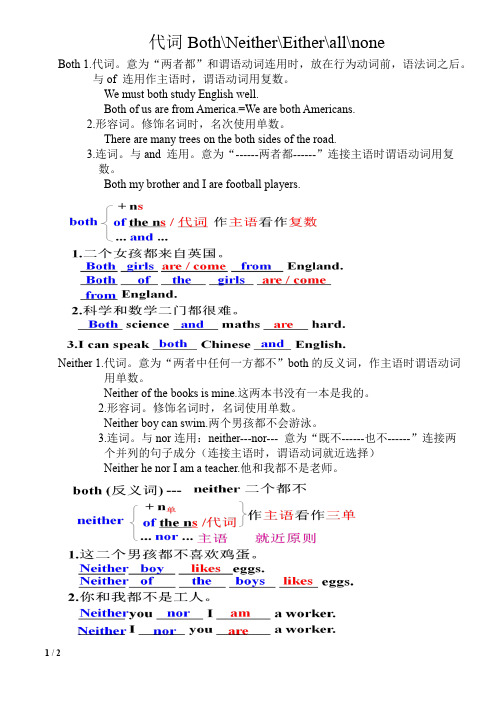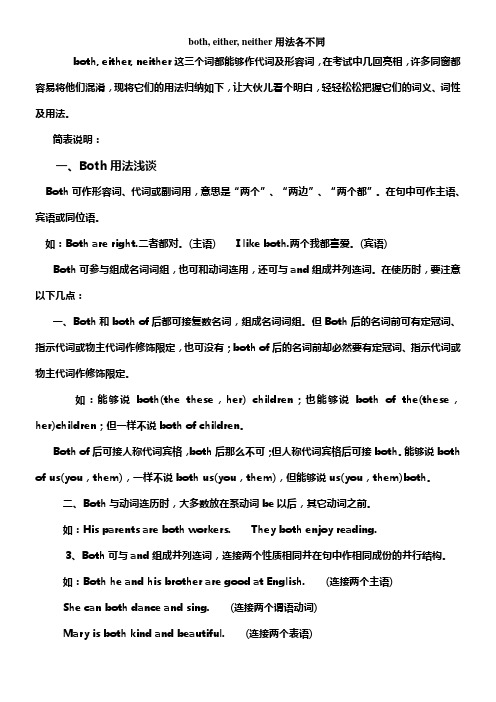both,either,neither用法
(完整word版)both--either--neither用法及练习题

both,either,neither用法各不同both, either, neither这三个词都可以作代词及形容词,在考试中频频亮相,许多同学都容易将他们混淆,现将它们的用法归纳如下,让大家看个明白,轻轻松松掌握它们的词义、词性及用法.简表说明:一、Both用法浅谈Both可作形容词、代词或副词用,意思是“两个”、“双方”、“两个都”。
在句中可作主语、宾语或同位语.如:Both are right。
两者都对.(主语)I like both。
两个我都喜欢。
(宾语)Both可参与构成名词词组,也可和动词连用,还可与and构成并列连词.在使用时,要注意下列几点:1、Both和both of后都可接复数名词,构成名词词组。
但Both后的名词前可有定冠词、指示代词或物主代词作修饰限定,也可没有;both of后的名词前却一定要有定冠词、指示代词或物主代词作修饰限定。
如:可以说both(the these,her) children;也可以说both of the(these,her)children;但一般不说both of children。
Both of后可接人称代词宾格,both后则不可;但人称代词宾格后可接both。
可以说both of us(you,them),一般不说both us(you,them),但可以说us(you,them)both。
2、Both与动词连用时,大多数放在系动词be之后,其它动词之前。
如:His parents are both workers。
They both enjoy reading。
3、Both可与and构成并列连词,连接两个性质相同并在句中作相同成分的并行结构。
如:Both he and his brother are good at English. (连接两个主语)She can both dance and sing. (连接两个谓语动词)Mary is both kind and beautiful。
both, either, neither用法各不同

both, either, neither这三个词都可以作代词及形容词,在考试中频频亮相,许多同学都容易将他们混淆,现将它们的用法归纳如下,让大家看个明白,轻轻松松掌握它们的词义、词性及用法。
简表说明:补充说明:both意思是"两者都",either意思是"两者中的任何一个",neither意思是"两者都不",三个词在句中都可以充当主语、宾语、定语和同位语。
①作主语时,可单独使用,也可以与of连用,其中both接谓语动词要求用复数形式;either,neither接谓语动词一般用单数形式,但这两者在口语中作主语时,其后的谓语动词也可以用复数。
例如:Both are right.= Both of the answers are right.这两个答案都对。
Either(of them)is OK. (他们两个中)任何一个都行。
②作宾语,可单独使用,也可以与of连用,放在动词或介词之后。
例如:I don't know which book is the better;I shall read both.我不知道这两本书哪一本好,所以我两本都读。
I like neither.(两个)我一个也不喜欢。
③作定语,both后面接复数名词,either和neither后面接单数名词。
例如:Both answers are right.两个答案都对。
On either side of the river there are a lot of trees.河的两边都有许多树。
Neither boy is going there.两个男孩儿都不打算去那里。
④both作主语的同位语,一般放在实义动词前,系动词be、情态动词、助动词后;作宾语的同位语,直接放在其后(either和neither做同位语的情况较少)。
例如:You must both come over this evening.你们俩今晚必须都过来一趟。
英语学习:表示两者的both, either与neither用法

英语学习:表示两者的both, either与neither用法表示两者的both, either与neither1. 这3个词都用来谈论两者:both 意为“(两者)都”,either意为“(两者中)任意一个”,neither 意为“(两者)都不”。
若要指三者或三者以上,分别用 all 意为“(三者)都”,any 意为“(三者中)任何一个”,none 意为“(三者)都不”等。
比较:He has two sons, both of whom are clever. 他有两个儿子,都很聪明。
He has three sons, all of whom are clever. 他有三个儿子,都很聪明。
He has two sons, either of whom is clever. 他有两个儿子,哪个都很聪明。
He has three sons, any of whom is clever. 他有三个儿子,哪个都很聪明。
He has two sons, neither of whom is clever. 他有两个儿子,两个都不聪明。
He has three sons, none of whom are clever. 他有三个儿子,个个都不聪明。
2. 它们既可用作代词,也可用作形容词。
用作形容词时,both后接复数名词,而 either 和 neither 之后要接单数可数名词。
如:Both of the brothers are here. / Both brothers are here.兄弟俩都在这儿。
Either of the books will do. / Either book will do. 两本书中哪一本都行。
Neither of the stories is interesting. /Neither story is interesting. 两个故事都没有趣。
代词both, either, neither 用作主语时,both 之后的谓语动词总是复数,either 和 neither 后的谓语动词通常用单数。
both either和 neither的用法

I haven't had breakfast.
肯定呢?
I have had breakfast.
Neither / Nor have we. So have we.
either
一、either...or...意为"或者……或者……;不是……就是……" 之意。表示两者之一,连接句子中两个并列的成分。
× both of children。
Both of后可接人称代词宾格,both后 则不可;但人称代词宾格后可接both。
√ both of us(you,them) × both us(you,them) √ us(you,them)both
二、Both与动词连用时,大多数放在系动词be之后,其它动词之前。 His parents are both workers. They both enjoy reading.
Both he and his brother are good at English. (连接两个主语)
She can both dance and sing. (连接两个谓语动词)
她能歌善舞。
Mary is both kind and beautiful. (连接两个表语)
玛丽既友善又漂亮。
四、含both的句子变为否定时,是将both改为neither。
He doesn't go to school by bike.
Neither / Nor do I.
They didn't go to the park yesterday. Neither / Nor did we.
They can't speak in German.
both, either, neither的用法区别必须要掌握的9个要点

both, either, neither的用法区别必须要掌握的9个要点They aren’t both apples.Neither they is an apple.Neither of them is an apple.They both are persimmons(柿子)。
(以上这四句话,只有一句是正确的,看看你能否判断出来)1. both的意思是“两者都”,只用指两个人或两个物,三个以上不能使用。
它作主语时谓语动词用复数形式。
如:(1)Both of the twins are very clever. 这对双胞胎两个都很聪明。
双胞胎是两个人,谓语动词用复数形式are.(2)Both of my parents are teachers. 我父母两个人都是教师。
父母亲是两个人,谓语动词用复数形式are.2. either 的意思是“两者中的任何一个”,它和both的意思一样,但强调的是其中的每一个,所以,它作主语时谓语动词只能用单数。
如上面的两个句子可分别改写为:(1)Either of the twins is very clever. 谓语动词变成了单数is.(2)Either of my parents is a teacher. 谓语动词变成了单数is, 表语teachers也成了单数。
3. either还可以作副词,用于否定句中表示“也”的意思。
如:I don’t want to go there, either. 我也不想去那里。
本句中的either不能换成too.4. neither在英语课本上一般翻译成“两者都不”的意思,但实际上,它是指“两者中的任何一个都不”,所以它作主语时,后面的谓语动词也和either一样,用单数。
如:Neither of us is a doctor. 我们两个人都不是医生。
本句强调我们两个人中的任何一个都不是,所以谓语动词用is而不用are,且表语用单数a doctor而不用复数doctors.。
both--either--neither用法各不同

both, either, neither用法各不同both, either, neither这三个词都可以作代词及形容词,在考试中频频亮相,许多同学都容易将他们混淆,现将它们的用法归纳如下,让大家看个明白,轻轻松松掌握它们的词义、词性及用法。
简表说明:补充说明:both意思是"两者都",either意思是"两者中的任何一个",neither意思是"两者都不",三个词在句中都可以充当主语、宾语、定语和同位语。
①作主语时,可单独使用,也可以与of连用,其中both接谓语动词要求用复数形式;either,neither接谓语动词一般用单数形式,但这两者在口语中作主语时,其后的谓语动词也可以用复数。
例如:Both are right.= Both of the answers are right.这两个答案都对。
Either(of them)is OK. (他们两个中)任何一个都行。
②作宾语,可单独使用,也可以与of连用,放在动词或介词之后。
例如:I don't know which book is the better;I shall read both.我不知道这两本书哪一本好,所以我两本都读。
I like neither.(两个)我一个也不喜欢。
③作定语,both后面接复数名词,either和neither后面接单数名词。
例如:Both answers are right.两个答案都对。
On either side of the river there are a lot of trees.河的两边都有许多树。
Neither boy is going there.两个男孩儿都不打算去那里。
④both作主语的同位语,一般放在实义动词前,系动词be、情态动词、助动词后;作宾语的同位语,直接放在其后(either和neither做同位语的情况较少)。
both,either,neither用法各不同[1]
![both,either,neither用法各不同[1]](https://img.taocdn.com/s3/m/20956eb8e45c3b3566ec8be8.png)
both, either, neither 用法各不同both, either, neither 这三个词都能够作代词及形容词,在考试中屡次亮相,很多同学都简单将他们混杂,现将它们的用法概括以下,让大家看个理解,轻轻松松掌握它们的词义、词性及用法。
简表说明:增补说明:both 意思是 "二者都 " ,either 意思是 " 二者中的任何一个 ",neither 意思是 " 二者都不 ",三个词在句中都能够充任主语、宾语、定语和同位语。
①作主语时,可独自使用,也能够与of 连用,此中 both 接谓语动词要求用复数形式; either,neither 接谓语动词一般用单数形式,但这二者在口语中作主语时,后来的谓语动词也能够用复数。
比如:Both are right.= Both of the answers are right.这两个答案都对。
Either(of them)is OK. (他们两此中 )任何一个都行。
②作宾语 ,可独自使用,也能够与of 连用,放在动词或介词以后。
比如:I don't know which book is the better ;I shall read both.我不知道这两本书哪一本好,因此我两本都读。
I like neither.(两个 )我一个也不喜爱。
③作定语, both 后边接复数名词 ,either 和 neither 后边接单数名词。
例如:Both answers are right.两个答案都对。
On either side of the river there are a lot of trees.河的两边都有很多树。
Neither boy is going there.两个男孩儿都不打算去那边。
④ both 作主语的同位语,一般放在实义动词前,系动词 be、神态动词、助动词后;作宾语的同位语,直接放在后来 (either 和 neither 做同位语的状况较少)。
代词neither_either_both用法总结

代词Both\Neither\Either\all\noneBoth 1.代词。
意为“两者都”和谓语动词连用时,放在行为动词前,语法词之后。
与of 连用作主语时,谓语动词用复数。
We must both study English well.Both of us are from America.=We are both Americans.2.形容词。
修饰名词时,名次使用单数。
There are many trees on the both sides of the road.3.连词。
与and 连用。
意为“------两者都------”连接主语时谓语动词用复数。
Both my brother and I are football players.Neither 1.代词。
意为“两者中任何一方都不”both的反义词,作主语时谓语动词用单数。
Neither of the books is mine.这两本书没有一本是我的。
2.形容词。
修饰名词时,名词使用单数。
Neither boy can swim.两个男孩都不会游泳。
3.连词。
与nor连用:neither---nor--- 意为“既不------也不------”连接两个并列的句子成分(连接主语时,谓语动词就近选择)Neither he nor I am a teacher.他和我都不是老师。
Either 1.代词。
意为“两者中的任何一个”谓语动词用单数。
Either of us is a student.2.形容词。
修饰名词时,名次使用单数。
Either boy can swim.两个男孩中有一个会游泳。
3.连词。
与or连用:either---or---意为“不是---就是---,要么---要么---,或者---或者---”连接两个并列的句子成分(连接主语时,谓语动词就近选择)用在否定句中和意思与neither ---nor---一样。
Either you or I am wrong.不是你错了就是我错了。
人教版九年级英语both, either, neither用法各不同

both, either, neither用法各不同both, either, neither这三个词都可以作代词及形容词,在考试中频频亮相,许多同学都容易将他们混淆,现将它们的用法归纳如下,让大家看个明白,轻轻松松掌握它们的词义、词性及用法。
简表说明:补充说明:both意思是"两者都",either意思是"两者中的任何一个",neither意思是"两者都不",三个词在句中都可以充当主语、宾语、定语和同位语。
①作主语时,可单独使用,也可以与of连用,其中both接谓语动词要求用复数形式;either,neither接谓语动词一般用单数形式,但这两者在口语中作主语时,其后的谓语动词也可以用复数。
例如:Both are right.= Both of the answers are right.这两个答案都对。
Either(of them)is OK. (他们两个中)任何一个都行。
②作宾语,可单独使用,也可以与of连用,放在动词或介词之后。
例如:I don't know which book is the better;I shall read both.我不知道这两本书哪一本好,所以我两本都读。
I like neither.(两个)我一个也不喜欢。
③作定语,both后面接复数名词,either和neither后面接单数名词。
例如:Both answers are right.两个答案都对。
On either side of the river there are a lot of trees.河的两边都有许多树。
Neither boy is going there.两个男孩儿都不打算去那里。
④both作主语的同位语,一般放在实义动词前,系动词be、情态动词、助动词后;作宾语的同位语,直接放在其后(either和neither做同位语的情况较少)。
both-either-neither用法及练习题

both, either, neither用法各不同both, either, neither这三个词都可以作代词及形容词,在考试中频频亮相,许多同学都容易将他们混淆,现将它们的用法归纳如下,让大家看个明白,轻轻松松掌握它们的词义、词性及用法。
简表说明:一、Both用法浅谈Both可作形容词、代词或副词用,意思是“两个”、“双方”、“两个都”。
在句中可作主语、宾语或同位语。
如:Both are right.两者都对。
(主语)I like both.两个我都喜欢。
(宾语)Both可参与构成名词词组,也可和动词连用,还可与and构成并列连词。
在使用时,要注意下列几点:1、Both和both of后都可接复数名词,构成名词词组。
但Both后的名词前可有定冠词、指示代词或物主代词作修饰限定,也可没有;both of后的名词前却一定要有定冠词、指示代词或物主代词作修饰限定。
如:可以说both(the these,her) children;也可以说both of the(these,her)children;但一般不说both of children。
Both of后可接人称代词宾格,both后则不可;但人称代词宾格后可接both。
可以说both of us(you,them),一般不说both us(you,them),但可以说us(you,them)both。
2、Both与动词连用时,大多数放在系动词be之后,其它动词之前。
如:His parents are both workers. They both enjoy reading.3、Both可与and构成并列连词,连接两个性质相同并在句中作相同成分的并行结构。
如:Both he and his brother are good at English.(连接两个主语)She can both dance and sing.(连接两个谓语动词)Mary is both kind and beautiful.(连接两个表语)4、含both的句子变为否定时,是将both改为neither。
(完整版)both--either--neither用法及练习题

both, either, neither用法各不同both, either, neither这三个词都可以作代词及形容词,在考试中频频亮相,许多同学都容易将他们混淆,现将它们的用法归纳如下,让大家看个明白,轻轻松松掌握它们的词义、词性及用法。
简表说明:一、Both用法浅谈Both可作形容词、代词或副词用,意思是“两个”、“双方”、“两个都”。
在句中可作主语、宾语或同位语。
如:Both are right.两者都对。
(主语)I like both.两个我都喜欢。
(宾语)Both可参与构成名词词组,也可和动词连用,还可与and构成并列连词。
在使用时,要注意下列几点:1、Both和both of后都可接复数名词,构成名词词组。
但Both后的名词前可有定冠词、指示代词或物主代词作修饰限定,也可没有;both of后的名词前却一定要有定冠词、指示代词或物主代词作修饰限定。
如:可以说both(the these,her) children;也可以说both of the(these,her)children;但一般不说both of children。
Both of后可接人称代词宾格,both后则不可;但人称代词宾格后可接both。
可以说both of us(you,them),一般不说both us(you,them),但可以说us(you,them)both。
2、Both与动词连用时,大多数放在系动词be之后,其它动词之前。
如:His parents are both workers. They both enjoy reading.3、Both可与and构成并列连词,连接两个性质相同并在句中作相同成分的并行结构。
如:Both he and his brother are good at English.(连接两个主语)She can both dance and sing.(连接两个谓语动词)Mary is both kind and beautiful.(连接两个表语)4、含both的句子变为否定时,是将both改为neither。
neither either both用法

Neither 1.代词。
意为“两者中任何一方都不”both的反义词,作主语时谓语动词用单数。
Neither of the books is mine.这两本书没有一本是我的。
2.形容词。
修饰名词时,名词使用单数。
Neither boy can swim.两个男孩都不会游泳。
3.连词。
与nor连用:neither---nor--- 意为“既不------也不------”连接两个并列的句子成分(连接主语时,谓语动词就近选择)Neither he nor I am a teacher.他和我都不是老师。
Either 1.代词。
意为“两者中的任何一个”谓语动词用单数。
Either of us is a student.2.形容词。
修饰名词时,名次使用单数。
Either boy can swim.两个男孩中有一个会游泳。
3.连词。
与or连用:either---or---意为“不是---就是---,要么---要么---,或者---或者---”连接两个并列的句子成分(连接主语时,谓语动词就近选择)用在否定句中和意思与neither ---nor---一样。
Either you or I am wrong.不是你错了就是我错了。
He doesn't know Germen or French.=He knows neither German nor French.Both 1.代词。
意为“两者都”和谓语动词连用时,放在行为动词前,语法词之后。
与of 连用作主语时,谓语动词用复数。
We must both study English well.Both of us are from America.=We are both Americans.2.形容词。
修饰名词时,名次使用单数。
There are many trees on the both sides of the road.3.连词。
与and 连用。
不定代词both, either和neither的用法

不定代词both, either和neither的用法(最新版)编制人:__________________审核人:__________________审批人:__________________编制学校:__________________编制时间:____年____月____日序言下载提示:英语语法是针对英语语言进行研究后,系统地总结归纳出来的一系列语言规则。
英语语法的精髓在于掌握语言的使用。
而且,英语语法是一套完整的语言知识体系。
如果你想英语能够更进一步,英语语法就是其中的主要一环。
Download tips: English grammar is a series of language rules that are systematically summarized after studying the English language. The essence of English grammar lies in mastering the use of language. Moreover, English grammar is a complete language knowledge system. If you want English to go further, English grammar is the main link.正文内容both, either和neither:这几个代词部谈两者的情况:both表示“两者都……”,either表示“两者中随便哪一个(都……)”,neither表示“两者中哪个都不……”。
它们可以用作:1)主语:Both(of them)are good.(它们)两个都很好。
Either(of the two books)will do.(两本书)随便哪一本都可以。
Neither(of the answers)is correct.(两个回答)哪一个都不对。
有关both,either,neither的用法

有关both,either,neither的用法在英语中,both、either和neither是常用的代词。
它们的用法有所不同,下面将详细介绍每个词的用法:1. bothboth一词表示“两者都”或“两者都是”,主要用于强调两个事物或人物具有相同的特征或行为。
它可以用作代词、形容词或副词。
例子:•Both of them are my friends.(他们两个都是我的朋友。
)•Both books are interesting.(这两本书都很有趣。
)•We both like ice cream.(我们两个都喜欢冰淇淋。
)2. eithereither一词表示“两者其中之一”,主要用于在两个选项中进行选择时。
它可以用作代词、形容词或副词。
例子:•You can take either bus to the city center.(你可以乘坐任一辆公交车去市中心。
)•You can choose either option.(你可以选择两个选项中的任意一个。
)•Either way is fine.(两种方式都可以。
)3. neitherneither一词表示“两者都不”,主要用于否定两个选择中的任何一个。
它可以用作代词、形容词或副词。
例子:•Neither of them can speak French.(他们两个都不会说法语。
)•Neither option is suitable for me.(这两个选项对我都不合适。
)•He likes neither coffee nor tea.(他既不喜欢咖啡也不喜欢茶。
)。
英语语法知识点详解Either Neither Both

英语语法知识点详解Either Neither BothEITHER & NEITHER & BOTHEITHER: I have two choices, but I can only pick one. 两者中的任何一个。
NEITHER: I have two choices, but I can pick zero.两者都不。
BOTH: I have two choices, but I can pick two.两者都。
◆EITHER, NEITHER, BOTH can be used alone.◆EITHER, NEITHER, BOTH均可单独使用。
★Which shirt do you want? 你想要哪件衬衫?★Either. 哪一件都行。
★Neither. 两件都不要。
★Both. 两件都要。
NEITHER:◆NEITHER + a singular noun 单数名词◆NEITHER + a singular noun as a subject takes a singular verb.◆NEITHER+单数名词作主语时,动词用单数,意为“两者皆非的”。
★Neither hand is clean.★两只手都不干净。
★One out of every 6 children is living with only one or neither parent.★每6个小孩中,就有1个只跟父亲或母亲住,或跟父母亲都不住在一起。
◆NEITHER can be used as a pronoun.◆NEITHER也可作代词,意为“两者当中没有一个”。
★Neither was suffering pain.★两人都无痛感。
★Two people had met the General before, but neither recognized him.★两个人以前都见过将军,但是两个人都没认出他来。
botheitherneither用法及练习题

both, either, neither用法各不同both, either, neither这三个词都能够作代词及形容词,在考试中几回亮相,许多同窗都容易将他们混淆,现将它们的用法归纳如下,让大伙儿看个明白,轻轻松松把握它们的词义、词性及用法。
简表说明:一、Both用法浅谈Both可作形容词、代词或副词用,意思是“两个”、“两边”、“两个都”。
在句中可作主语、宾语或同位语。
如:Both are right.二者都对。
(主语) I like both.两个我都喜爱。
(宾语)Both可参与组成名词词组,也可和动词连用,还可与and组成并列连词。
在使历时,要注意以下几点:一、Both和both of后都可接复数名词,组成名词词组。
但Both后的名词前可有定冠词、指示代词或物主代词作修饰限定,也可没有;both of后的名词前却必然要有定冠词、指示代词或物主代词作修饰限定。
如:能够说both(the these,her) children;也能够说both of the(these,her)children;但一样不说both of children。
Both of后可接人称代词宾格,both后那么不可;但人称代词宾格后可接both。
能够说both of us(you,them),一样不说both us(you,them),但能够说us(you,them)both。
二、Both与动词连历时,大多数放在系动词be以后,其它动词之前。
如:His parents are both workers. They both enjoy reading.3、Both可与and组成并列连词,连接两个性质相同并在句中作相同成份的并行结构。
如:Both he and his brother are good at English. (连接两个主语)She can both dance and sing. (连接两个谓语动词)Mary is both kind and beautiful. (连接两个表语)4、含both的句子变成否按时,是将both改成neither。
- 1、下载文档前请自行甄别文档内容的完整性,平台不提供额外的编辑、内容补充、找答案等附加服务。
- 2、"仅部分预览"的文档,不可在线预览部分如存在完整性等问题,可反馈申请退款(可完整预览的文档不适用该条件!)。
- 3、如文档侵犯您的权益,请联系客服反馈,我们会尽快为您处理(人工客服工作时间:9:00-18:30)。
3.18 both, either, neither, all, any, none
这些词都可用作代词或形容词。
其位置都在be 动词之后,行为动词之前或第一助动词之后。
1)both (两者都),either(两者中任何一个),neither (两者都不)。
以上词使用范围为两个人或物。
Neither of the two boys is clever.两个男孩都不聪明。
2) both,either
both与复数连用,either与单数连用。
Both the boys are clever.两个男孩都很聪明。
Either of the two boys is clever. 两个男孩都很聪明。
There are flowers on both sides of the street.
(两岸)
There are flowers on either side of the street.
(岸的两边)
路边长满了野花。
3) all (所有的,全部的人或物),any (任何一个),none (都不)。
以上词使用范围为三者以上。
All the flowers are gone.所有的花都谢了。
I don't like any of the flowers.这些花我都不喜欢。
I like none of the flowers.这些花我都不喜欢。
注意:all与none用法一样。
跟单数名词,用单数动词;跟复数名词,用复数动词。
All of the students are there.
所有的学生都在那。
All (of) the milk is there.
所有的牛奶都在那。
